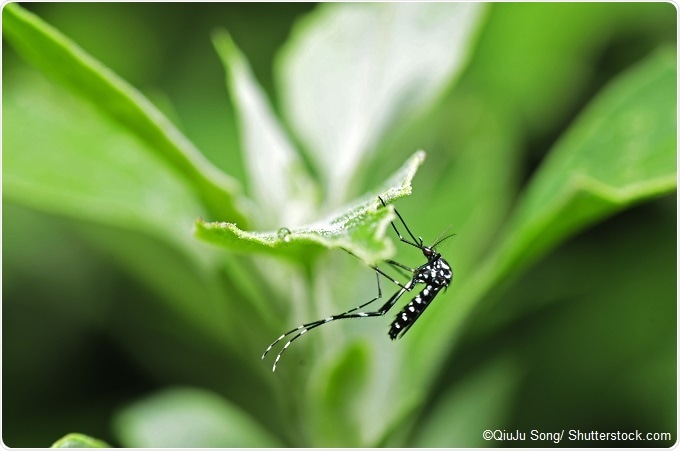The study published in Nature Communications on May 19 found that Aedes aegypti, the primary mosquito that carries the Zika virus, might also transmit chikungunya and dengue viruses with one bite.
The findings of the new study led by Colorado State University researchers shed new light on what is known as a coinfection, which scientists said is yet to be understood completely and may be fairly common in areas experiencing outbreaks.

"A mosquito, in theory, could give you multiple viruses at once," said Claudia Ruckert, post-doctoral researcher in CSU's Arthropod-borne and Infectious Diseases Laboratory, who presented initial findings from the study last fall at the annual meeting of the American Society of Tropical Medicine and Hygiene in Atlanta, Georgia.
To learn more about the transmission of more than one infection from a single mosquito bite, the mosquitoes in the lab were infected with multiple kinds of viruses. Although the CSU team described the lab results as surprising, they mentioned that there is no reason to believe that these coinfections are more severe than a single virus infection at a time. The available research on coinfections is scarce and the findings differ.
The Aedes aegypti mosquitoes living in tropical, subtropical, and in some temperate climates transmit Chikungunya, dengue, and Zika viruses to humans. The likelihood of coinfection by multiple viruses may be on the rise as these viruses continue to emerge into new areas. At the same time, the frequency of coinfection and its clinical and epidemiologic implications are not understood well.
According to the study, chikungunya and dengue virus coinfection were first reported in1967. The coinfections of Zika and dengue viruses, Zika and chikungunya, and all three viruses have been reported during various outbreaks more recently, including the zika outburst in North and South America.

Ruckert said the research team found that mosquitoes in the lab can transmit all three viruses at the same time, even though this is likely to be very rare in nature. "Dual infections in humans, however, are fairly common, or more common than we would have thought," she said.
CSU researchers had expected to find that one dominant virus out competed the other two in the mid-gut of the mosquito where the infections start and reproduce before being transmitted to humans.
"It's interesting that all three replicate in a really small area in the mosquito's body," Ruckert said. "When these mosquitoes get infected with two or three different viruses, there's almost no effect that the viruses have on each other in the same mosquito."
Greg Ebel, director of the Arthropod-borne and Infectious Diseases Laboratory and co-author of the study, said "On the one hand, all of these viruses have mechanisms to suppress mosquito immunity, which could lead to synergy. On the other hand, they all likely require similar resources within infected cells, which could lead to competition."
Following the link between infection of Zika virus with microcephaly—baby born with a small head and incomplete brain development, in Brazil, concerns about the virus skyrocketed last year.
In 2008 Brian Foy, CSU associate professor in the Arthropod-borne and Infectious Diseases Laboratory, made a connection that Zika virus could be transmitted sexually in addition to being spread by mosquitoes. Following the news, concerns about Zika virus were also heightened.
The symptoms of dengue and chikungunya virus are comparable to symptoms of Zika virus infection—similar to the flu and may be accompanied by a skin rash, and can also include joint and bone pain, nose or gum bleeding, and bruising.
"There's no strong evidence that coinfection of humans results in infections that are clinically more severe," Ruckert said.
However, findings are conflicting. In one study, a team in Nicaragua examined a large number of coinfection cases, but no changes in hospitalization or clinical care were seen. Nevertheless, a possible link between neurological complications and coinfection was found in other studies.
"There might be some indications, but it is still fairly unknown what the effect is from coinfection," said Ruckert. It is also possible that coinfections in humans are considerably underdiagnosed. "Depending on what diagnostics are used, and depending on what the clinicians think, they might not notice there's another virus," Ruckert said. "It could definitely lead to misinterpretation of disease severity."
Ruckert and the team in the Ebel Lab are now looking closely at the outcome when mosquitoes are infected with multiple viruses and they will explore the effect of coinfection on the evolution of viruses within the mosquito.
The team is also paying attention to learning more about where the viruses replicate in mosquitoes, and by potentially examining yellow fever—fourth virus that is carried by Aedes aegypti, as a likelihood for coinfection with chikungunya, dengue, or Zika viruses.In December 2016, the Brazilian Ministry of Health reported a continuing outburst of yellow fever virus found in the tropical and subtropical areas in South America and Africa.
According to the Centers for Disease Control and Prevention, yellow fever is a very rare cause of illness in people traveling to U.S. However, the mortality rates are between 20 percent and 50 percent in people who develop severe illness related to yellow fever virus.
Source:
https://www.eurekalert.org/pub_releases/2017-05/csu-mts051717.php